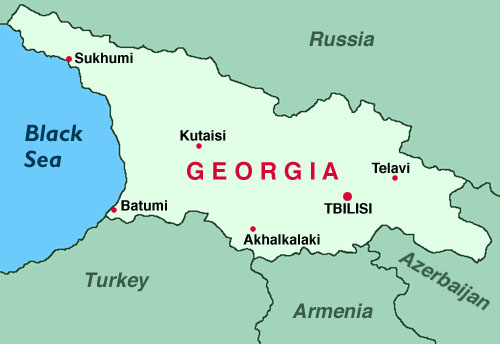
map of Georgia

Flag of the republic
Official Name: Georgia

map of Georgia |

Flag of the republic |
| Dideba
National Anthem |
Area: 70,000 sq km;
Cities: Capital - Tbilisi (pop 1.5 million 1996)
Terrain: Mostly rugged and mountainous
Climate: Generally moderate; mild on the Black Sea coast with cold
winters in the mountains.
Nationality: Noun and adjective-Georgian(s).
Population: 5.5 million.
Population growth rate: -1.02%
Ethnic groups: Georgian 77.1%, Armenian 7.1%, Russian 4.5%,
Azerbaijan 5.5%, Ossetian 2%, Abkhaz 1%, other 2.8%.
Religion: Georgian Orthodox 70%,
Muslim 10%, Russian Orthodox 7%, Armenian Apostolic 7%, 6%-other.
Language: Georgian (official), Abkhaz also official language in
Abkhazia
Education: Years compulsory- 12 (starts from year 2000).
Literacy- 99%.
Government
Type: Republic.
Constitutional update : October 17, 1995. First Constitution-
February 21st of 1921
Branches: Executive-president with State Chancellery.
Legislative-unicameral parliament: 232 members. Judicial-supreme court,
prosecutor general and local courts, constitutional court.
Subdivisions: 63 districts, including those within the two
autonomous republics (Abkhazia and Ajaria ) .
Political parties: Citizens Union of Georgia, National
Democratic Party, United Republican Party, Georgian Popular
Front, Georgian Social Democratic Party, All Georgia Revival Union, Greens
Party, Agrarian Party, Georgia Socialist Party and others.
Suffrage: Universal over 18.
Natural resources: citrus fruits, tea,
wine;
nonferrous metals; textiles; chemicals; fuel re-exports.
Industry: steel, aircraft, machine tools, foundry equipment,
(automobiles, trucks and tractors,) tower cranes, electric welding
equipment, machinery for food packing; electric motors, textiles, shoes,
chemicals, wood products, bottled water and wine.
Georgian history is over 3,200 years old, and Georgian is one of the oldest living languages in the world. Tbilisi, located in a picturesque valley divided by the Mtkvari river, is more than 1,500 years old. Much of Georgia's territory was besieged by its Persian and Turkish neighbors along with Arabs and Mongols over the course of the seventh to the eighteenth centuries . After eleven centuries of mixed fortunes of various Georgian kingdoms, including a golden age from the 11th to 12th centuries, Georgia turned to Russia for protection. Russia essentially annexed Georgia and exiled the royalty in 1801. Pockets of Georgian resistance to foreign rule continued, and the first Republic of Georgia was established on May 26, 1918 after the collapse of Tsarist Russia. By February 1921, the Red army had reoccupied the country and Georgia became part of the Soviet Union. On April 9, 1991, the Supreme Council of the Republic of Georgia declared independence from the U.S.S.R.
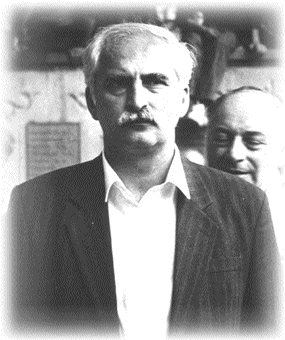
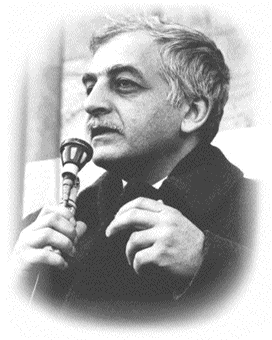
Merab Kostava and Zviad Gamsakhurdia, leaders of Georgian National Movement in 1991. Kostava died in very strange situation. Gamsakhurdia was president of the country in 1991-1992,
Georgians are renowned for their hospitality and artistry in dance, theater, music and design.
20th Century History
Beset by ethnic and civil strife from independence in 1991, Georgia began to stabilize in 1995. The more than 230,000 internally displaced persons present on enormous strain on local politics. Peace in the separatist areas of Abkhazia and Samachablo (known as south Ossetia), overseen by Russian peacekeepers and international organizations, will continue to be fragile, requiring years of economic development and negotiation to overcome local enmities. Considerable progress has been made in negotiations of the Ossetian-Georgian conflict.
The Georgian government is committed to economic reform in cooperation with the IMF and World Bank, and stakes much of its future on the revival of the ancient Silk Road - as the Eurasian Corridor, using Georgia's geography as a bridge for transit of goods between Europe and Asia.
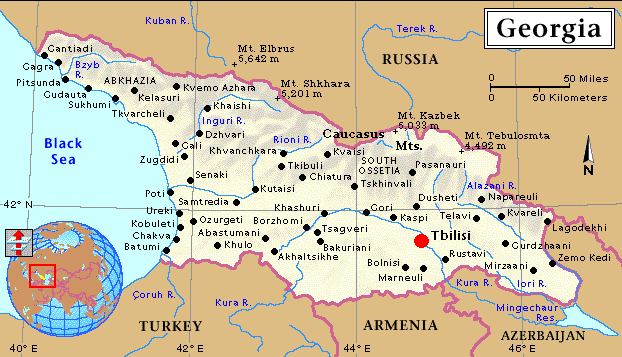
Georgia has been a democratic republic since the presidential elections and constitutional referendum of October 1991. The President is elected for a term of 5 years; his constitutional successor is the Chairman of the Parliament.
The Georgian state is highly centralized, except for the autonomous regions of Abkhazia and Ajaria, which are to be given special autonomous status once Georgia's territorial integrity is restored. Those regions were subjects of special autonomies during Soviet rule and the legacy of that influence remains. Local elections have been taken in November 15.
President-Eduard A. Shevardnadze 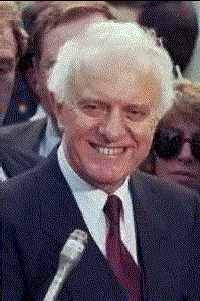
State Minister-Vazha Lortkipanidze
Chairman of the Security Council-Nugzar Sajaia
Chairman of Parliament-Zurab Zhvania
Foreign Minister-Irakli Menagharishvili
Ambassador to the United States-Tedo Japaridze
Political Conditions
Since surviving an assassination attempt in August 1995 by reactionary forces opposed to reform, President Shevardnadze has consolidated his leadership and moved ahead with an ambitious and courageous reform agenda. Elections on November 5, 1995, described as the freest and fairest in the Caucasus or Central Asia, gave him the presidency and a resulted in a progressive parliament led by sophisticated reformers.
Georgia's location, nestled between the Black Sea, Russia and Turkey, gives it strategic importance far beyond its size. It is developing as the gateway from the Black Seas to the Caucasus and the larger Caspian region, but also serves as a buffer between Russia and Turkey. Georgia has a long and close relationship with Russia, but is reaching out to its other neighbors and looking to the West in search of alternatives and opportunities. It signed a cooperation agreement with the EU, participates in the Partnership for Peace, and is encouraging foreign investment. Georgia is the member of CIS and Euro Council
The Abkhaz separatist dispute absorbs much of the government's attention. While a cease-fire is in effect, more than 230,000 internally displaced persons (IDP's) who were driven from their homes during the conflict, constitute a vocal lobby. The government has offered the region considerable autonomy in order to encourage a settlement which would allow the IDPs, the majority of whom are ethnic Georgians from the Gali region, to return home, but the Abkhaz insist on virtual independence. pictures of tragedy
Currently, Russian peacekeepers, under the authority of the Commonwealth of Independent States, are stationed in Abkhazia, along with UN observers, but both groups have recently had to restrict their activities due to increased land-mine sowing and guerrilla activity. Russian-led negotiations have not resulted in movement toward a settlement, and the Georgians have recently appealed to the Western powers to become more directly involved in the process. Working with France, UK, Germany, and Russia and through the UN and the OSCE, the U.S. continues to encourage a comprehensive settlement consistent with Georgian independence, sovereignty and territorial integrity. In the meantime, the UN observer force and other organizations are quietly encouraging grassroots cooperative and confidence-building measures in the region.
The parliament has instituted wide-ranging political reforms supportive of higher human rights standards, but problems persist, largely as a result of the unwillingness of certain law enforcement and criminal justice officials to support constitutionally mandated changes. Mistreatment of detainees is a significant and continuing problem, as is corruption within certain state agencies and monopolies.
Political Parties
Citizens Union of Georgia is not a party in the American sense but an amalgam of groups/individuals who support President Eduard Shevardnadze. It's not based on some political ideology.
The National Democratic Party represents the opposition in parliament. It's strongest rightist party and faction in Georgia. It's chairman was Giorgi (Gia) Chanturia, he was killed in 1994, now the chairman of the party is his wife Irina Sarishvili-Chanturia. This party has also young sub-organization Young National Democrat
Motto : "Truth everywhere and always." Political direction : rights. Date of foundation : 1917, restored in 1981. First registration : 1992; new registration : 1998. Founders : Gia Chanturia, Irakli Kadagishvili. Organizational structure : congress (once every 2 years) - main committee (for 2 year term, 21 members) - presidium (7 members : I. Sarishvili-Chanturia, I. Kadagishvili, R. Sakvarelidze, U. Lipartia, O. Melkadze, I. Kvachakhia, G. Khmelidze) - chairman (is elected by a congress for 2 year term, last elected in 1998). Chairman : Irina Sarishvili-Chanturia (1964), a philologist, MP, chairman of the parliamentary group "NDP - National-Democrat Party". Number of members : about 15,000 (active - about 5.500), 12% - women. The party has a youth organization - Young National Democrat (founded in 1993, about 3.000 members), 11 regional and 69 district organizations. Printing body : the newspaper Kartuli Chronika and the journal "Moambe". The party is a member of Christian-Democrat International. The party participated in the 1992 parliamentarian elections and received 20-22% of votes, had 14 MPs in Parliament (11 by a party list and 3 - majoritarian). The party participated in the 1995 parliamentarian elections and received 7,97% of votes, has 12 MPs in Parliament (10 by the party list and 2 majoritarian, they are united in a parliamentary group "NDP - National-Democrat Party". Pre-electoral program priorities in the 1995 elections : truth everywhere and always. Welfare for every Georgian Family. In the 1995 presidential elections the party did not support any candidate. program priorities 1. Economics : free market economics, private property on land. 2. Foreign Policy : Western orientation. 3. Territorial Arrangement of the State : unitary. 4. State System: constitutional monarchy. 5. Intern-ethnic relations: cultural autonomies. The party does not support the course of current government in home policy, and partially supports - in foreign policy. Pre-electoral program : election of mayors and heads of administrations, private property on land, welfare for retired. The party has presented its electoral lists at 295 proportional district.
| Irina Sarishvili Chanturia, chairman
Address : 8, Kipshidze St., Tbilisi, Geo. phone : +(99532) 23 39 13. |
NDP main office Address :
21, Rustaveli Ave., Tbilisi. Phone : (99532) 98 35 36; 98 88 12; 98 31 86. Fax : (99352) 93 19 78, 92 12 67. . |
The Revival Union Party is a vehicle for political representation in Tbilisi of the Ajarian region. The Abkhaz faction remains vocal and influential in pushing for resolution of the Abkhaz conflict.
Georgia is a member of the UN, the OSCE and the CIS, Council of Europe . Our goal is to get in EU as soon as possible.
Following the defeat of the disparate Georgian militias in Abkhazia in September 1993, Georgia began the process of building a modern army. Substantial progress has been made, including the creation of a single military force under a unified command structure, answerable to elected civilian officials. The Georgians are actively participating in the Partnership for Peace (PFP) and other military exchange programs. The U.S. provides Georgia with bilateral security assistance, including through the International Military Education and Training (IMET) program. Evolving U.S.-Georgia partnerships include programs by the Georgia (U.S.) National Guard, visits by a Coast Guard cutter to Georgia, and a Georgian delegation hosted by the U.S. Coast Guard. The new era of Georgian Military started in 1997, when the president changed the minister of defense and chose Davit Tevzadze. The new minister has new and fresh policies and ideas.
Word Georgia derives from the name of Saint George long time appreciated as one of the guardians of the nation. His image in the battle with a snake appears on the modern symbol of the Republic of Georgia .
Georgians are very warm people and always have the hope that they will have better future!
|
The capital, Tbilisi, is more than 1500 years old. There are many legends associated with the birth of the city. According to one legend, King Vakhtang Gorgasali, some 1500 years ago, shot down a beautiful deer while hunting in a mountain valley. The wounded animal feel into a spring. Suddenly it leaped out of the water and to the King's astonishment, bounded away as swift as an arrow. The water in the spring was warm and seemed to possess a mysterious healing power. The king ordered a town to be built there and it was named Tbilisi, from the word tbili meaning warm. Tbilisi, like the rest of Georgia, lived through trying times. Four times the city was overrun by foreign armies, plundered and left in ruins. Each time it rose from the ashes. |
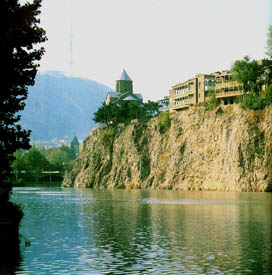
Metechi Church overlooking on rv. Mtkvari |
So it has interesting history with quite a lot architectural monuments and buildings of different centuries. There're the picturesque ruins of the ancient citadel of Narikala (from the 4th century), Metekhi Castle (build in the 13th century) and Cathedral Church of Sioni (6th-7th centuries) and some other churches, number of museums and picture galleries.
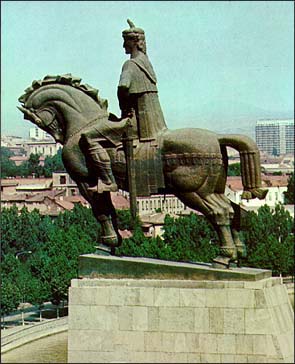
Vachtang Gorgasali, King founder of Tbilisi, 5 th cen. |
The city stretches for more than 35 kilometers along the banks of the river Mtkvari. Tbilisi's population is about 1.5 million. All government offices are located in Tbilisi. Today Tbilisi is a scientific and cultural center of Georgia. It is the seat of the Georgian Academy of Sciences and more than a hundred research institutes. There are four state Universities and about 15 private Universities and Institutes. |
The second variation of the legend. (it's almost same)
The word Tbilisi derives from "tbili" meaning warm in Georgian. According to a legend, Georgian king Vahtang Gorgasaly was falcon hunting in the area where he was going to build a new capital. His falcon caught a bird, but dropped it. The bird was found later in a hot stream almost boiled and ready to be served for lunch :-). Those hot streams turned to be very healthy mineral sources long used for in Tbilisi Turkish baths 19th and 20th centuries.
With historical evolution and among different nations Georgia has been called different names. The one which perished in ancient times is Iberia . Russians call it Groozia. Georgians call it Sakartvelo which means "Georgian countryside". On this matter, Levan Kverenckiladze (Scientest) commented: "Word Georgia doesn't derive from the name of the Saint George. Neither does it come from a Greek word 'georgos'. Instead, it is related to what Persians called Georgians. And that was 'gurdzhi' or 'gurzhi'. Hence come the Russian name gruzia (gurzia) and the European names, too."
Analogesly, Tbilisi is also called Tiflis and Tebrize.
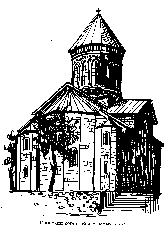
Church |
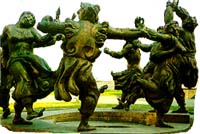
Berikebi |
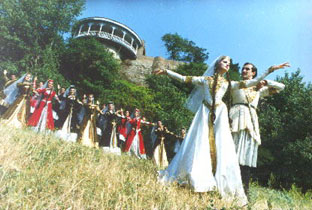
Georgian traditional dancers |
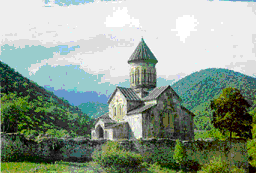
Fitareti |
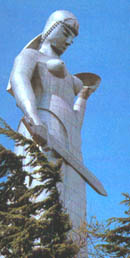
Kartlis deda (mother of kartli) |

Tbilisi State University (TSU) |
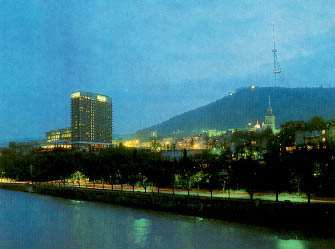
Tbilisi at night |
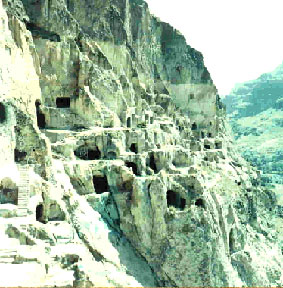
Vardzia-Old city in Mountain, south Georgia, 12th cen. |
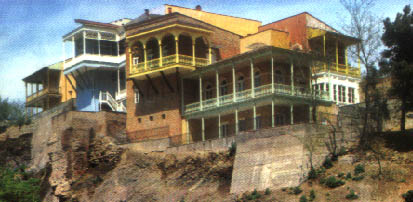
Old Tbilisi |
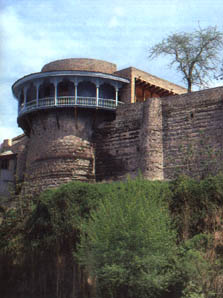
Old Tbilisi |

National soccer stadium, in Tbilisi |
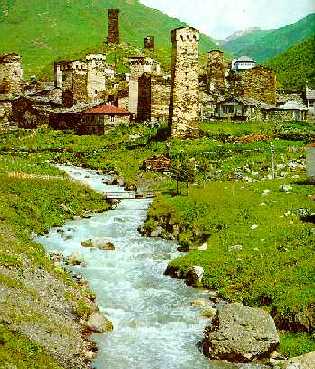
Region of Georgia-Svaneti |
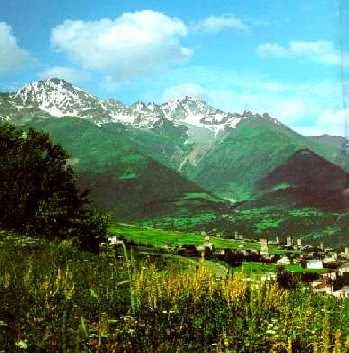
Mountain region of Georgia |
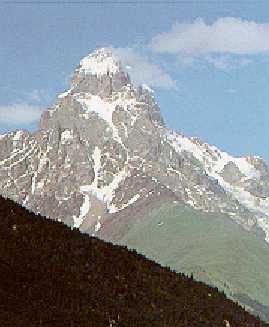
In Georgia it's very common to see high mountains like this. It's about 5000 mt. |
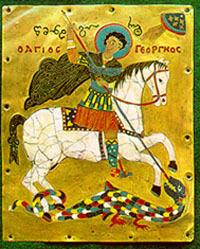
Saint Giorgi (George) |

David Agmashenebeli, the greatest king of Georgia |

Soso Jugashvili, know as Joseb Stalin, leader of Soviet Union. Born in Gori, Georgia. |
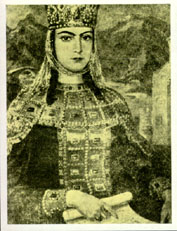
Queen Tamar |
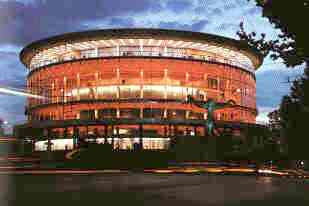
Filarmonia, Tbilisi |

Opera, Tbilisi |
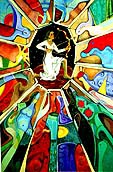
Painting of Georgian artist Nino Karumidze |